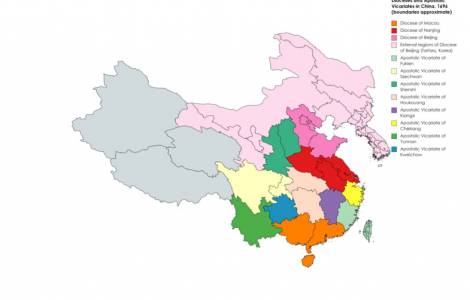
Wikimedia Commons
Shanghai (Agenzia Fides) - The "Primum Concilium Sinense", the fundamental assembly of the Catholic Church in China, held in Shanghai in 1924 under the leadership of the Pontifical Delegate Costantini (see Fides, 21/5/2024), had already recognized the "Sinicization" of Catholicism in China as a historical priority and, in this perspective, had also considered the criteria for adjusting the boundaries of the ecclesiastical dioceses in Chinese territory. This is what Professor Liu Zhiqing underlines in his many lectures and studies, citing the words of Cardinal Costantini, according to whom the Church, with respect for the legitimate civil authorities, has the mission of "glorifying the Lord and saving souls".
For Professor Liu Zhiqing, the words of Cardinal Celso Costantini and the guidelines for the path of the Catholic Church in China established by the Shanghai Council a hundred years ago are still relevant today, also with regard to the open questions regarding the division of ecclesiastical districts in Chinese territory.
As Professor Liu also points out in his lectures, one of the "Vota" that the Council of Shanghai submitted to the Holy See included the request for a new division of the ecclesiastical regions and districts of China, expanding from the existing five regions to 17 ecclesiastical districts, which in principle corresponded to the division of the civil provinces at the time. Recently, Professor Liu also participated in the conference "Historical development and characteristics of the sinicization of Catholic Dioceses in China", organized at the end of October by the Shanghai Academy of Social Sciences and the Center for Religious and Cultural Studies. The insights shared in this study conference also touch on questions of interest for the present and future of Chinese Catholicism. The division of Catholic dioceses in China is one of the most important issues at the heart of current and future negotiations between the Holy See and the Chinese government. In his presentation at this conference, which was divided into six historical sections, Liu traced in detail the development of Catholic ecclesiastical dioceses in China, starting with the role of Portugal in establishing the first dioceses, according to the practices related to the so-called “Padroado” (system of patronage granted by the Holy See to the Portuguese monarchies from the 15th century onwards, on the basis of which the rulers of Portugal were given ecclesiastical jurisdiction over large territories outside Europe).
Professor Yan Kejia, Director of the Center for the Study of Religion and Culture (who also headed the Institute for the Study of Religion of the Shanghai Academy of Social Sciences for many years), stressed that Professor Liu's historical analysis shows how “the attitude of growing, mutual trust between China and the Holy See offers mutual benefits” and “opens up new perspectives for research also in the historical field”. Professor Liu Zhiqing is Director of the Institute of History and Social Development and Executive Director of the Institute for the Study of Religion and Culture at Anyang Normal University (Henan Province).
Liu Zhiqing has been studying and researching Chinese Catholicism for more than 30 years and has published articles and volumes of high scientific value during this time.
In 2017, Liu Zhiqing published a work entitled "History of the Evolution of Catholic Dioceses in China", a comprehensive overview that covers the history of the ecclesiastical district from its foundation to 1946. The volume was republished in 2023 (see Fides, 15/6/2024) in a new, updated version enriched with new contributions and findings. The volume is also accompanied by a "Table on the history of the development of the Catholic dioceses of China". The work is the result of years of research and in-depth studies, also based on the consultation of sources and documents kept in the archives of religious congregations, as well as on the direct testimonies of authoritative figures of the Chinese Catholic Church, such as Bishop Thomas Zhang Huaixin (1925-2016), who headed the diocese of Weihui (now Anyang) in the province of Henan. (NZ) (Agenzia Fides, 14/12/2024)